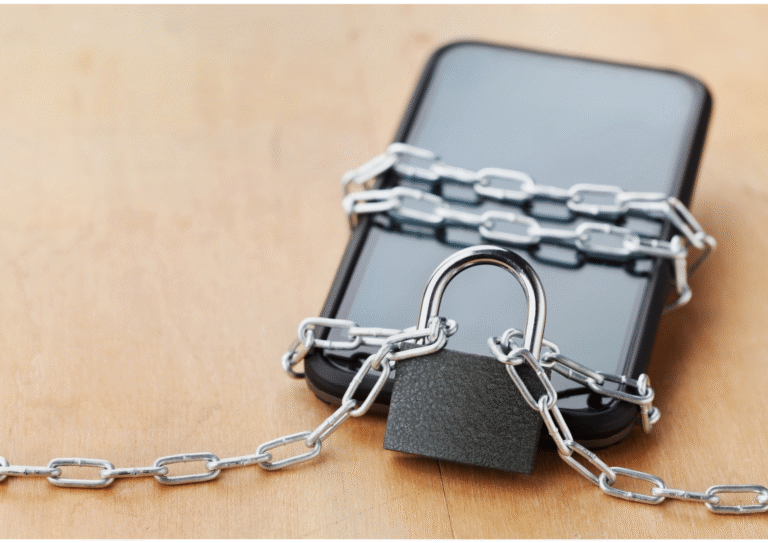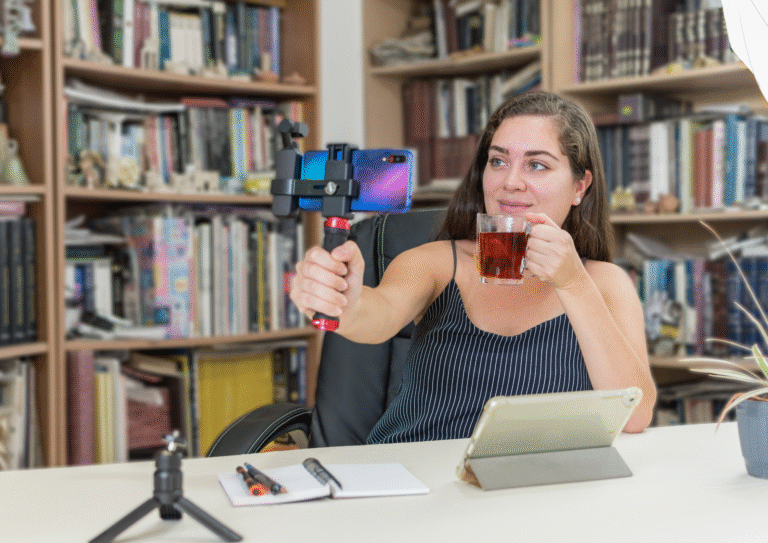
Is your brain feeling foggy? Learn how too much digital stuff clogs your mind and how to clear it out in 7 easy steps. Find out why clearing your digital space is key to a calmer, more focused you.
What’s Really Clogging Your Brain These Days?
It’s probably not just stress from homework or friends. It’s more likely all the digital clutter . , . like the 27 tabs open in your internet browser, 39 group chats buzzing, 11 apps running in the background, and that third time you’ve scrolled through bad news in just one hour (doomscroll). You really want to feel more focused, be more present in what you’re doing, and just feel calm. But the constant buzzing and bright lights of the digital world won’t let you take a breath. If you’ve ever wished you could feel like your old self again without completely getting rid of all your tech, then this article might be just what you need to reset your whole system.
Let’s get into why digital decluttering . , . which means cleaning up your digital life . , . matters more than you think.
Why Digital Declutter Matters More Than People Realize
At first glance, cleaning up your digital life might sound like another complicated trick to be more productive. Maybe just another box to check off a list, or a new trend that will go away soon. But if you look deeper, having too much digital stuff actually changes how our brains work. Studies show that when our brains get constant digital stimulation . , . meaning they’re always getting new information and notifications . , . it breaks up our attention, makes our memory worse, and increases feelings of anxiety. [1]
As a result, you’re not just tired. You’re digitally scattered . , . meaning your mind is spread out in too many directions, like a weak Wi-Fi signal in a place where it can’t reach well. You feel mentally stretched and unable to focus.
We all know that using social media too much or being addicted to screens can cause problems. But often, we just tell ourselves, “Oh well, that’s just how life is now.” This idea that we can’t change it comes at a cost. Your ability to think clearly, be creative, and even have good relationships with people are all affected by your digital habits. But unlike old emails or screenshots, your brain can’t just be put away in an archive. It’s time to take this digital mess seriously because it affects your health.
“But It’s Just How Life Works Now”: The Common Rebuttal
Some people might argue:
“Digital clutter is just the price we pay for being connected to everything. It’s just how modern life is . , . we can’t just log off and move to the woods where there’s no internet.”
And they’re not entirely wrong. The digital world is where many of us work, learn for school, connect with friends and family, and even meet new people. Completely cutting yourself off from all technology is not realistic for most people. It might even seem like you’re having a big life crisis!
However, decluttering doesn’t mean deleting everything you own online.
Instead, it means changing your relationship with technology so that it works for you instead of taking over your life. Think of it like owning a fridge: You want food in it, of course. But if it’s overflowing with old, expired food and sauces, it’s going to be really hard to find the actual meal you want to eat. Your digital life can be the same.
The Cognitive Toll of Clutter
Digital clutter doesn’t just look messy; it actually affects how your brain works. According to a study published in Nature Communications, when people do too many digital tasks at once (like texting, watching a video, and checking email all at the same time), it leads to poor attention control. This is especially true for young adults. [2]
So, that “quick check” of your email while you’re also watching a YouTube video and trying to answer a message? It’s not harmless. Your brain has to switch between tasks every single time you do this. Each switch burns cognitive fuel, which is like your brain’s energy. This leaves you feeling mentally exhausted and “fried.”
This explanation of digital declutter shows why your ability to focus and think clearly really depends on how well you manage all the information you take in online.
And in case you’re wondering, yes . , . digital clutter can make you feel “dumber.” Not permanently, of course. It’s more like that feeling where you just read something, and then immediately forgot what it said. It’s that kind of mental fog. Even worse, many of us will scroll past this very paragraph and not even remember it . , . right about now.
Step into the Mess: How We Get Digitally Cluttered
There isn’t just one bad guy here. The digital mess just slowly sneaks into our lives.
- Remember that app you downloaded just to get a special discount code? You probably never deleted it.
- What about those 42 notifications waiting on your phone? You ignore them, but they’re still there, quietly glowing.
- And that anxious feeling you get when your phone isn’t in your hand or nearby? Yeah, that’s not a great sign either.
And don’t even get me started on cloud storage like Google Drive. If a famous old writer named Dante were alive today, one part of Hell in his stories would just be “trying to find your resume in a huge pile of files with no names.”
But Wait . . . There’s (Still) Hope
Here’s the good news: You don’t need to completely disconnect from technology. You just need to organize it better. And yes, it is possible to reset your brain, even if your TikTok account thinks you’re a night owl with a serious skincare obsession at 3 AM.
7 Steps to Digital Declutter That Actually Stick
- Start with the homepage: Clean up the main screen of your phone or computer. Fewer icons mean fewer things to distract you.
- Audit your apps: Go through all your apps. If you haven’t used an app in the last 30 days, uninstall it. You probably don’t need it.
- Limit notifications: Only allow alerts for truly important things, like calendar reminders for school or a message from your mom. Turn off all the others.
- Schedule tech-free blocks: Try setting aside 30 minutes each day where you put your phone in another room. This lets your brain take a real break and breathe.
- Unsubscribe ruthlessly: Your email inbox is not a museum for emails you “might read someday.” If you don’t open newsletters or promotions, unsubscribe from them. Get rid of the clutter!
- Use one tab rule: When you’re working on something, try to only keep one internet browser tab open for that specific task. (You’re not fooling anyone . , . having 20 tabs open doesn’t make you more productive!)
- Reflect weekly: Once a week, ask yourself, “What digital thing caused me the most stress this week?” Once you know, try to fix or remove that problem.
On the surface, these steps seem small. But much like hidden calories in salad dressing, digital distractions and interruptions add up very quickly and can drain your mental energy.
The Science of a Reset
Brain researchers have a name for clearing mental space by removing digital clutter: it’s called cognitive offloading. This helps your mind focus on deeper, more important tasks. According to Dr. Gloria Mark, who wrote the book Attention Span, even a short 20-minute break from digital devices can start to restore your mental focus. [3]
Let’s say it clearly: your brain was not designed to work like an internet browser with 50 tabs open at once.
Giving your brain space helps you get back:
- Focus: Your ability to concentrate on one thing.
- Memory retention: How well you remember things.
- Emotional regulation: Your ability to manage and control your feelings.
Even just one hour a day of time away from digital clutter has been shown to make people feel better and sleep better. So, the next time someone tells you to “just power through” all your digital tasks, remind them that even machines crash when they are overloaded!
A Moment of Dark Humor
Of course, we all think we’ll eventually clean up our phones. Just like we think we’ll brush our teeth perfectly every day, do our taxes early, or stop looking at our ex-partner’s new social media posts.
Spoiler alert: We probably won’t.
Unless we start treating digital clutter like the real health issue it actually is.
What Happens After the Reset?
Here’s the part nobody really tells you: the goal isn’t to become a super strict, tech-free person. It’s to become more intentional. Intentional means being thoughtful and purposeful about how you use technology.
Once your digital space is under control, you’ll find you can think much clearer, you’ll feel less stressed, and . , . strangely enough . , . you’ll even enjoy your tech more when you do use it. The quick feelings of pleasure (dopamine hits) you get from social media or games feel much better when they don’t have to fight through a lot of mental noise and clutter in your brain.
Final Thought: This Is Your Brain on Clutter
You don’t need another trick to be more productive.
You need a system that keeps the important things right in front of you . , . and throws everything else in the recycle bin.
Digital decluttering is not just a chore you do on one weekend. It’s a mindset shift. This means changing the way you think about things.
It’s about asking yourself: “Is this app, this file, or this endless scrolling really helping me live better . , . or is it just keeping me busy and draining my brain?”
Next Step: Pick just one area . , . maybe your phone, your email inbox, or one social media app . , . and spend just 15 minutes today cleaning it up. Only 15 minutes. You’ll be surprised at how much lighter your brain feels afterwards.
Because in this always-on world, the bravest thing you can do . , . is pause.
📚 Sources:
- Rosen, L. D. (2020). The Distracted Mind: Ancient Brains in a High-Tech World. (This book explains how constant digital stimulation impacts attention, memory, and anxiety.)
- Woods, A. T., Sella, F., & Gillebert, C. R. (2021). Excessive digital multitasking predicts impaired sustained attention in young adults. Nature Communications, 12(1), 596. https://www.nature.com/articles/s41467-020-20220-4 (This study highlights how too much digital multitasking affects your ability to focus.)
- Mark, G. (2023). Attention Span: A Groundbreaking Way to Restore Balance, Happiness, and Productivity. (This book discusses how digital breaks can restore mental focus.)




